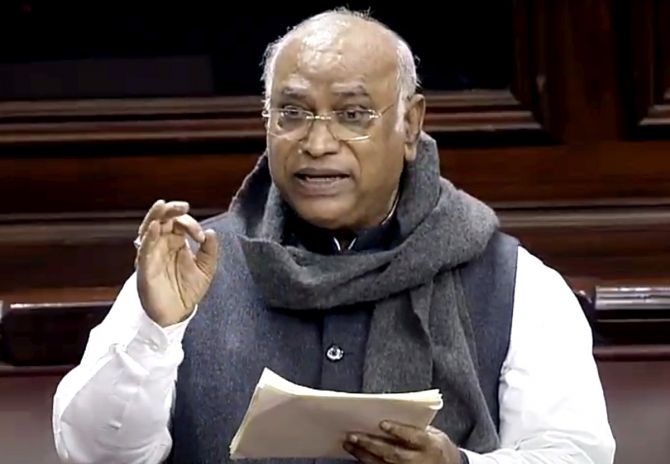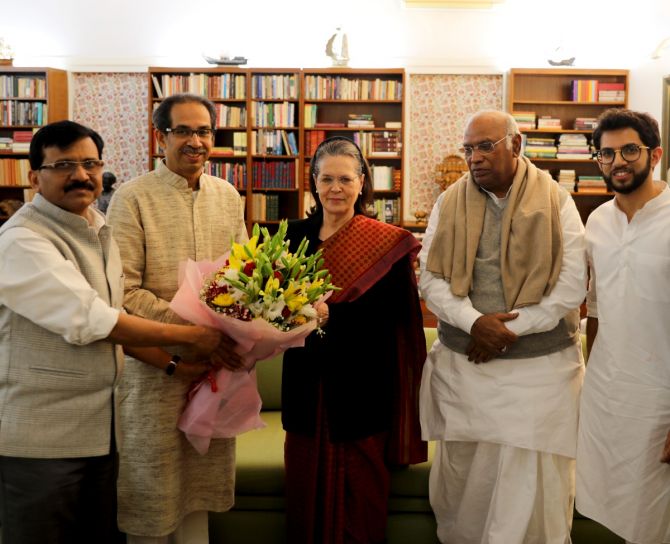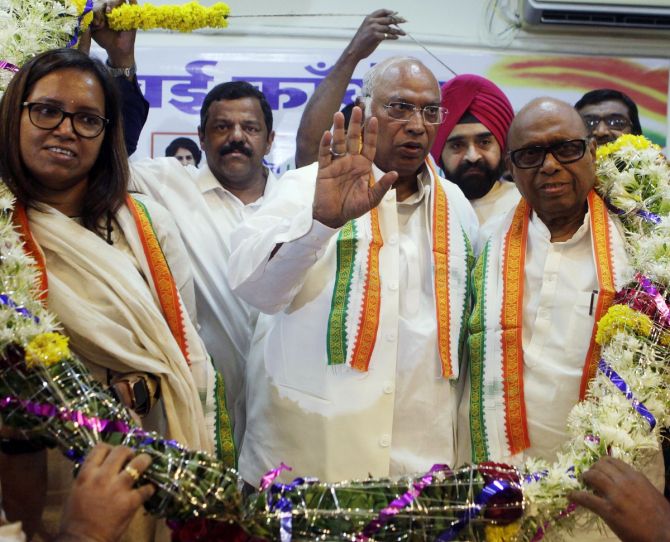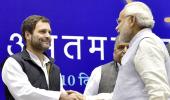The less charitable in the party say he owes his appointment Sonia Gandhi -- the family wanted someone who wouldn't talk back and would not exert himself too much, notes Aditi Phadnis.

Only a few leaders have had the good fortune to be Leader of the Opposition in both the Lok Sabha and the Rajya Sabha.
Jaswant Singh and L K Advani, both from the Bharatiya Janata Party, come to mind.
The reason is not too hard to figure out: It is the BJP that has been in the Opposition much longer in the past 70 years.
But for a party to repose so much faith in a man that he embodies the spirit of the Opposition in both Houses! Well, that's a signal achievement.
And in the Congress, it is Mapanna Mallikarjun Kharge who can lay claim to that distinction, the first ever in his party, even if the speaker in the last Lok Sabha, Sumitra Mahajan, refused to recognise him in that position because the Congress could get only 44 seats when it was required to secure at least 55 seats -- 10 per cent of the strength of the House to qualify for the position of Leader of the Oposition.

Mr Kharge has had a good record of winning elections. Barring the Lok Sabha election in 2019, when he lost his home borough, Karnataka's Gulbarga, to the BJP, he has never lost.
He won from the Gurmitkal assembly constituency in Karnataka nine times in a row before he plunged into the Lok Sabha poll arena in 2009.
He won from Gulbarga in 2014, when the tide was against the Congress.
That said, in a House that has such stellar personalities as P Chidambaram and Jairam Ramesh, did the Congress really need to choose a man who is 78 and came to the Rajya Sabha after losing in the Lok Sabha elections?
Although Mr Kharge doesn't like to ve reminded that he is a Dalit, it is possible that the Congress was using caste as a message to its supporters in Karnataka.
If that was the case, shouldn't it have found someone who represents the most oppressed, the most marginalised among the Dalits? The scheduled castes and scheduled tribes in Karnataka together constitute 23.5 per cent of the population and account for 18 per cent reservation in the government and educational sectors (15 per cent for SCs and 3 per cent for STs).
But the SCs in Karnataka are broadly divided into right-hand (Holeyars) and left-hand (Madigas).
The Holeyars (the right-hand Dalits) shun the Madigas in all the ways in which the upper castes shun them: There is no inter-marriage, inter-dining or social relations between the two sub castes.
Moreover, the left-hand Dalits feel the right-hand Dalits corner all the benefits of reservation.
Most of the Dalit Congress leaders in Karnataka, whether it is Mr Kharge or G Parameshwara, the chief of the state party, are right-hand Dalits.
The net result is: The left-hand Dalits have all decamped to the BJP.

Mr Kharge began life as a trade union lawyer and knows what it is to struggle.
What he really wanted was to become chief minister -- from 1972, when he won from the Gurmitkal assembly constituency and became a minister in the Devaraj Urs government in 1976.
He was a minister in the Gundu Rao ministry in 1980, the S Bangarappa cabinet in 1990, and in the M Veerappa Moily government from 1992 to 1994.
His role changed in 1994, when he became the Opposition leader in the Karnataka ssembly.
In 1999, he was among the contenders for chief minister but was pipped to the post by S M Krishna.
In 2004, it was Dharam Singh who bested him. In 2013, the BJP government in Karnataka fell, but again Mr Kharge lost the chance. Siddaramaiah got the top job.
From 2014 to 2019, Kharge fought insult and humiliation and, worse, on behalf of the Congress.
There are several committees on which the presence of the Leader of the Opposition is mandatory -- to select the chief of the CBI and the CVC, to name just two.
He boycotted the meetings to select the Lokpal because he was invited to participate as a 'special invitee' with no powers, since he was not recognised as Leader of the Opposition.
The less charitable in the party say he owes his present appointment to the grace of Sonia Gandhi -- the family wanted someone who wouldn't talk back and would not exert himself too much -- basically an unquestioning, unthreatening loyalist. Mr Kharge certainly fits that description.
We now have to see how, as an 'acknowledged' Leader of the Opposition, he acquits himself in a House where the Opposition has the capacity to assert itself.
Feature Presentation: Rajesh Alva/Rediff.com












 © 2025
© 2025